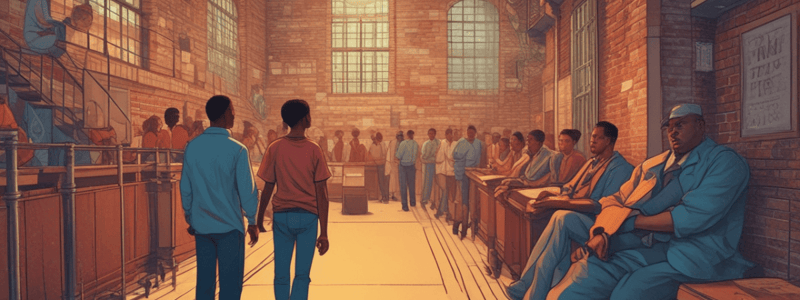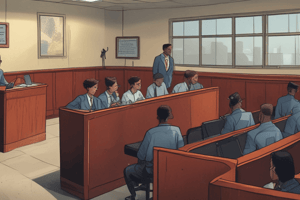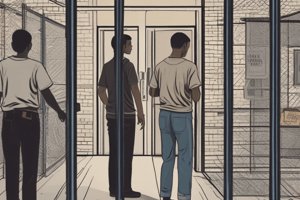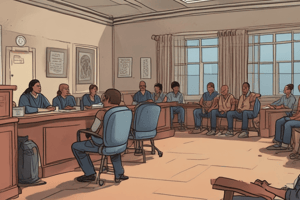Podcast
Questions and Answers
What is the purpose of diversion programs for juvenile offenders?
What is the purpose of diversion programs for juvenile offenders?
- To increase negative consequences
- To burden the juvenile court system
- To minimize negative consequences and reduce the burden on the juvenile court (correct)
- To increase incarceration rates
True or false:The juvenile justice system prioritizes rehabilitation over punishment.
True or false:The juvenile justice system prioritizes rehabilitation over punishment.
False (B)
When must Miranda warnings be given to a juvenile in a criminal cause?
When must Miranda warnings be given to a juvenile in a criminal cause?
- Before questioning (correct)
- After questioning
- During a hearing
- Miranda warnings are not required for juveniles
True or false: Status offenses are considered criminal offenses regardless of the offender's age.
True or false: Status offenses are considered criminal offenses regardless of the offender's age.
What is the focus of intervention programs in juvenile courts?
What is the focus of intervention programs in juvenile courts?
True or false: Deinstitutionalization mandates that all youth offenders be placed in secure detention facilities.
True or false: Deinstitutionalization mandates that all youth offenders be placed in secure detention facilities.
What is the purpose of competency to stand trial?
What is the purpose of competency to stand trial?
True or false: The Juvenile Justice and Delinquency Prevention Act provides funding to states that meet federal standards for youth protections.
True or false: The Juvenile Justice and Delinquency Prevention Act provides funding to states that meet federal standards for youth protections.
True or false: The C TIM reviews juvenile court cases and determines whether to refer offenders to diversion programs or to court.
True or false: The C TIM reviews juvenile court cases and determines whether to refer offenders to diversion programs or to court.
Why have juvenile court proceedings and records shifted towards more openness and transparency over the years?
Why have juvenile court proceedings and records shifted towards more openness and transparency over the years?
What is the purpose of the child welfare system?
What is the purpose of the child welfare system?
True or false: A juvenile's right to a jury trial is guaranteed in all states.
True or false: A juvenile's right to a jury trial is guaranteed in all states.
True or false: The American Bar Association encourages juveniles to plead guilty in court.
True or false: The American Bar Association encourages juveniles to plead guilty in court.
What is included in the definition of child maltreatment?
What is included in the definition of child maltreatment?
Who investigates reports of suspected abuse or neglect in the child welfare system?
Who investigates reports of suspected abuse or neglect in the child welfare system?
True or false: Competency is not a necessary requirement for a fair juvenile trial.
True or false: Competency is not a necessary requirement for a fair juvenile trial.
What happens if abuse or neglect is substantiated in the child welfare system?
What happens if abuse or neglect is substantiated in the child welfare system?
True or false: The federal government has no involvement in regulating state child welfare systems.
True or false: The federal government has no involvement in regulating state child welfare systems.
What is the role of the federal government in the child welfare system?
What is the role of the federal government in the child welfare system?
True or false: CPS agencies investigate reports of suspected child abuse and neglect.
True or false: CPS agencies investigate reports of suspected child abuse and neglect.
True or false: Families of children who are removed from their homes for maltreatment receive no services or support.
True or false: Families of children who are removed from their homes for maltreatment receive no services or support.
What is the purpose of plea bargaining in the juvenile justice system?
What is the purpose of plea bargaining in the juvenile justice system?
True or false: The publication of a juvenile offender's name or photograph obtained legally is unconstitutional according to the US Supreme Court.
True or false: The publication of a juvenile offender's name or photograph obtained legally is unconstitutional according to the US Supreme Court.
What is the current status of public attendance at juvenile court proceedings?
What is the current status of public attendance at juvenile court proceedings?
Flashcards are hidden until you start studying
Study Notes
- Law enforcement officers determine whether a juvenile offender should be referred to juvenile court or diverted to alternative programs.
- Alternative options to apprehension or referral include questioning and warning, issuing a citation, or referral to a diversion program or service.
- Miranda warnings must be given before questioning a juvenile in a criminal cause.
- Diversion to an alternative program and service minimizes negative consequences and reduces the burden on the juvenile court.
- Juvenile offenders may be held in a secure detention facility pending a hearing before a judge.
- Plea bargaining may occur at any stage of the juvenile justice system.
- Juvenile courts focus on individualized intervention programs that emphasize rehabilitation and treatment.
- Several disposition options are available for judges in the juvenile justice system.
- Juvenile court proceedings and records have shifted towards more openness and transparency over the years.
- Competency to stand trial is required for a fair trial.
- The public has a right to attend court proceedings to increase government accountability.
- Many states prohibited the public from attending juvenile court proceedings for privacy reasons, but this was ruled unconstitutional.
- The child welfare system aims to ensure the safety of children from maltreatment and promote stable family relationships.
- Child maltreatment includes physical, sexual, emotional abuse, and neglect.
- Each state manages its child welfare system, which includes public and private services.
- CPS agencies investigate reports of suspected abuse or neglect.
- CPS caseworkers determine whether abuse or neglect is substantiated or unsubstantiated.
- If abuse or neglect is substantiated, the juvenile court may be involved through a child protection or dependency proceeding.
- Most families of children who are removed receive services to reduce the risk of maltreatment in the future and reunite with the child.
- The federal government provides support through funding and legislative initiatives.
Studying That Suits You
Use AI to generate personalized quizzes and flashcards to suit your learning preferences.




